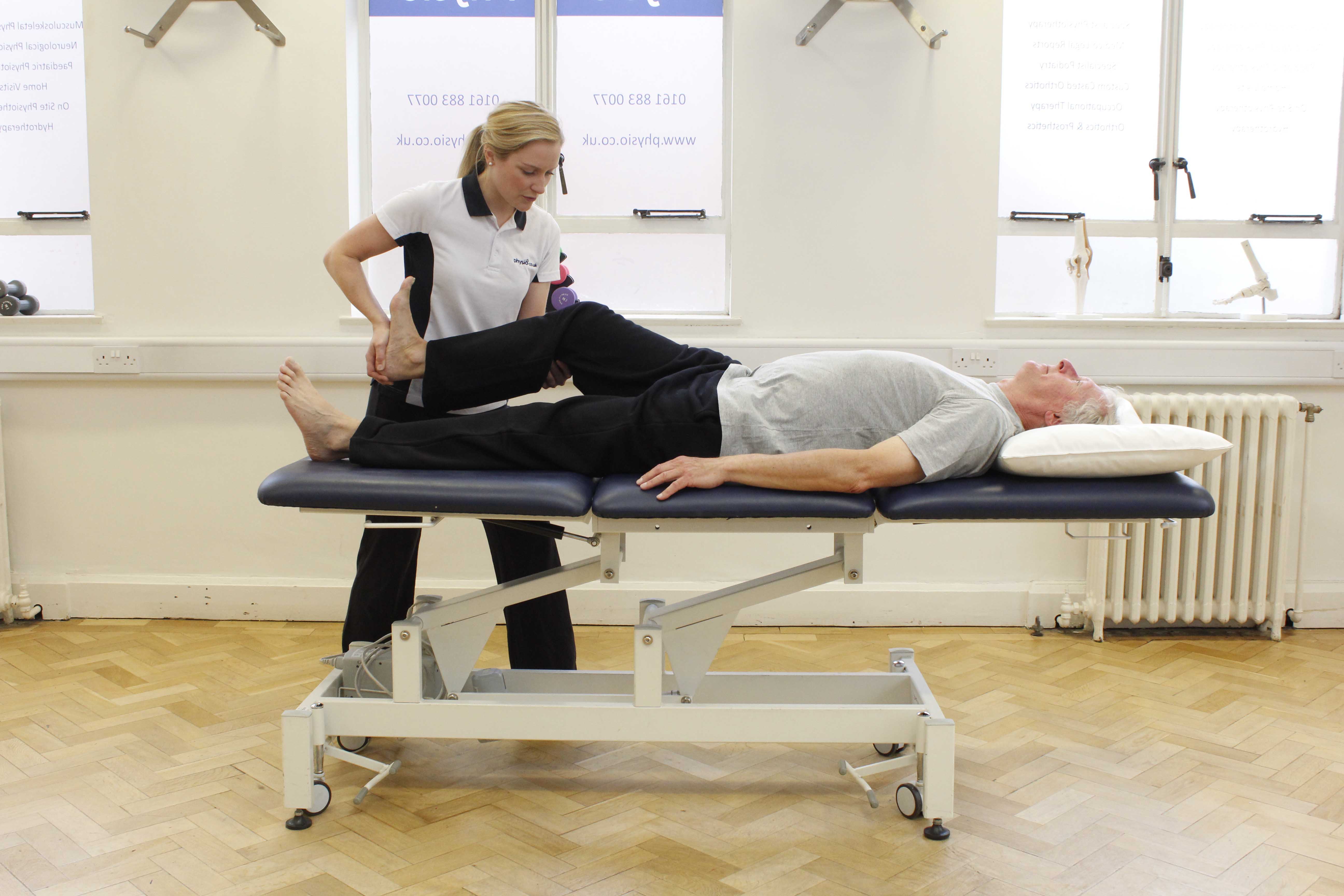Symptoms of peripheral vascular disease
The symptoms of peripheral vascular disease include muscle cramping, muscle weakness, cold extremities and pain. The pain can be intermittent or persistent in nature and may accompany blue or pale limbs and reduced hair and nail growth on the affected limb. These symptoms can be mild and unnoticed or they can be severe and cause significant reductions in ability to move around and carry out a normal active life.
 Above: Stretches and mobilisations supervised by an experienced physiotherapist
Above: Stretches and mobilisations supervised by an experienced physiotherapistCauses of peripheral vascular disease
Peripheral vascular disease is caused by narrowing of the arteries that provide the blood supply to muscle and soft tissues of the limb. The narrowing is caused by a process called atherosclerosis. Atherosclerosis is the growth of fatty deposits and hardening of the arteries which prevent the blood from passing through the vessels smoothly. Factors which increase the risk of atherosclerosis and thus peripheral vascular disease include smoking, age, family history of heart disease or stroke, obesity and diabetes. Raised blood pressure and cholesterol can contribute to atherosclerosis therefore they should be controlled with anti-hypertension and statins. A lack of physical exercise is a modifiable risk factor which can be rectified with guidance and support from a physiotherapist.
Diagnosis of peripheral vascular disease
If peripheral vascular disease is suspected, your doctor will check your ankle brachial pressure index to check the blood pressure in your calf. If the readings are normal, they will carry out a Doppler ultrasound of the lower limb to look at the extent of atherosclerosis. Other imaging studies include angiography or computed tomography (CT) scan.
Treatment of peripheral vascular disease
Most of the symptoms of peripheral vascular disease can be reduced via modification of risk factors. Individuals with peripheral vascular disease are given smoking cessation advice, support to limit alcohol intake and encouragement to increase regular exercise. Blood pressure, cholesterol and glucose levels are tightly monitored to ensure specific safe target levels are maintained.
In severe cases of peripheral vascular disease, more invasive treatment options may be considered such as angioplasty or bypass surgery. Occasionally, the individual with peripheral vascular disease may require amputation of the limb.
Physiotherapy for peripheral vascular disease
An experienced physiotherapist from Physio.co.uk will carry out a detailed assessment of your symptoms and problems and suggest a treatment plan. Depending on your clinical presentation, treatment for peripheral vascular disease may include:
- Pain management
- Cardiovascular exercise
- Sensory stimulation and massage
- Muscle strengthening
- Joint and muscle mobilisations
- Mobility practice
- Provision of walking aids and footwear advice
Your physiotherapist will provide you with an exercise program for you to complete in your own time at home. This will include a range of exercises which will work towards your goals. Exercises may include stretches, strengthening work, balance activities and providing sensory stimulation to your hands and feet. It may be useful for a partner or relative to learn how to help you complete these exercises and how they can help you at home. Your physiotherapist will supply any equipment you may need to get around at home, for example a walking stick, frame or outdoor walker. Our colleagues at Manchester Podiatry and Manchester Occupational Therapy will be available to provide vascular assessment and advice regarding functional activities to those with peripheral vascular disease.
Individuals with peripheral vascular disease significantly benefit from regular physiotherapy treatment to minimise symptoms and reduce the risk of further complications. The benefits of physiotherapy for peripheral vascular disease include:
- Increased mobility
- Increased stamina and fitness
- Increased muscle strength
- Increased range of movement
- Improved sensation
- Decreased pain and muscle cramping
- Decreased risk of further circulatory and cardiovascular problems
- Decreased risk of falls
Why choose Physio.co.uk for peripheral vascular disease
At Physio.co.uk we understand the debilitating symptoms of peripheral vascular disease. Our experienced clinicians can provide treatment that is proven to minimise your symptoms and improve your overall quality of life.
- No waiting lists
- Treatment at any stage of your condition
- Treatment in your home or at the clinic
- Flexible appointment times
- Professional, holistic physiotherapists
- Liaison with all health professionals involved in your care
- Access to specialist orthotist services
- Access to podiatry

 0330 088 7800
0330 088 7800

































